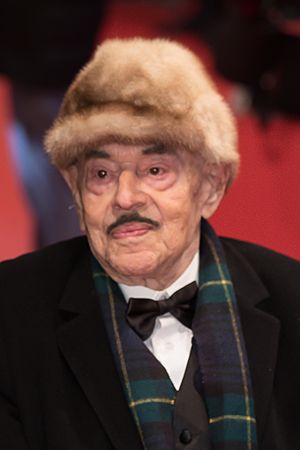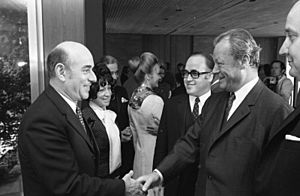Artur Brauner facts for kids
Quick facts for kids
Artur Brauner
|
|
|---|---|

Brauner attending the Berlinale 2018
|
|
| Born |
Abraham Brauner
1 August 1918 |
| Died | 7 July 2019 (aged 100) Berlin, Germany
|
| Occupation | Film producer |
| Years active | 1946–2019 |
Artur "Atze" Brauner (born Abraham Brauner; August 1, 1918 – July 7, 2019) was a famous German film producer and businessman. He was born in Poland and produced over 300 movies starting in 1946.
Contents
Artur Brauner's Early Life and Film Career
Artur Brauner was born in Łódź, Poland. He was the oldest son in a Jewish family. His father worked as a timber wholesaler. Artur went to school in Łódź and later studied at a technical school.
In September 1939, Germany attacked Poland. Artur, his parents, and his four brothers and sisters had to flee to the Soviet Union. They survived the Holocaust, a terrible time when many Jewish people were killed. After the war, Artur and his brother, Wolf, moved to Berlin, Germany. His parents and three other siblings moved to Israel. Sadly, many of his relatives died during the Holocaust.
Artur Brauner married Theresa Albert, also known as Maria, in 1947. They had four children together.
How Artur Brauner Started in Film
When Artur was young, he watched a film called The Testament of Dr. Mabuse by Fritz Lang. This movie really inspired him and made him want to work in film.
In September 1946, he started his own film company called Central Cinema Company, or CCC Films. It was located in the American part of Berlin. One of his first films was Sag' die Wahrheit (Tell the Truth). This was one of the first movies made in Germany after World War II.
His next film, Morituri, did not make much money. This put him in debt. Artur learned an important lesson: to make the movies he truly cared about, he also needed to produce popular films that audiences would love. These popular films would help pay for the more serious, critically acclaimed movies.
He encouraged many German filmmakers who had worked in Hollywood to come back to Germany. One of these was Robert Siodmak, and later, Fritz Lang himself. Lang even helped bring back the Dr. Mabuse film series that had inspired Artur.
Brauner's Work on Holocaust Films and Awards
Artur Brauner was very dedicated to making films about the Holocaust. In 2009, a place called Yad Vashem (a memorial to the victims of the Holocaust) received 21 of his films that focused on this important topic. These films included Die Weiße Rose and The Plot to Assassinate Hitler.
In 2010, Yad Vashem even opened a special media center named after Artur Brauner. He called this the "crowning achievement of my film career," meaning it was the most important thing he had done in his film work.
Artur Brauner was an important member of the Jewish community in Berlin. He received many honors, including the Bundesverdienstkreuz, which is a high award in Germany. At the Berlin International Film Festival in 2003, he received the Berlinale Kamera award for all his achievements in film over his lifetime.
He also won two Golden Globe Awards and an Academy Award for a film he helped produce called The Garden of the Finzi-Continis. Artur Brauner lived and worked in Berlin for many years. He turned 100 years old in August 2018 and passed away on July 7, 2019, in Berlin.

Selected Films Produced by Artur Brauner
Artur Brauner produced over 250 movies! Here is a list of some of the films he produced:
| Year | Title | Director | Notes |
|---|---|---|---|
| 1946 | Tell the Truth | Helmut Weiss | |
| 1948 | Morituri | Eugen York | |
| 1955 | The Plot to Assassinate Hitler | Falk Harnack | German Federal Film Award |
| 1955 | Die Ratten | Robert Siodmak | Golden Bear |
| 1959 | Der Tiger von Eschnapur | Fritz Lang | |
| 1959 | Das indische Grabmal | Fritz Lang | |
| 1960 | The Thousand Eyes of Dr. Mabuse | Fritz Lang | |
| 1960 | The Good Soldier Schweik | Axel von Ambesser | Nominated for a Golden Globe |
| 1961 | The Marriage of Mr. Mississippi | Kurt Hoffmann | |
| 1962 | Sherlock Holmes and the Deadly Necklace | Terence Fisher | |
| 1963 | Man and Beast | Edwin Zbonek | |
| 1964 | Old Shatterhand | Hugo Fregonese | |
| 1966/67 | Die Nibelungen | Harald Reinl | 2 films |
| 1970 | The Bird with the Crystal Plumage | Dario Argento | |
| 1970 | The Garden of the Finzi-Continis | Vittorio De Sica | Academy Award |
| 1982 | Die Weiße Rose | Michael Verhoeven | |
| 1985 | Angry Harvest | Agnieszka Holland | Nominated Academy Award |
| 1990 | Europa Europa | Agnieszka Holland | Golden Globe |
| 2003 | Babiy Yar | Jeff Kanew | |
| 2006 | The Last Train | Joseph Vilsmaier and Dana Vávrová |
Awards and Honors
Artur Brauner received many important awards for his work in film:
- 1965: Goldene Leinwand (Golden Screen) for Old Shatterhand
- 1965: Goldene Leinwand for Der Schut
- 1967: Goldene Leinwand for Die Nibelungen
- 1970: Golden Bear for The Garden of the Finzi-Continis
- 1972: Academy Award for The Garden of the Finzi-Continis
- 1983: Deutscher Filmpreis: Filmband in Silber (Film Award in Silver) for Die Weiße Rose
- 1990: Deutscher Filmpreis: Filmband in Gold (Film Award in Gold) for his "long and outstanding work in German cinema"
- 1992: Golden Globe for Europa Europa
- 1993: Bundesverdienstkreuz I. Klasse (Order of Merit of the Federal Republic of Germany, First Class)
- 2000: Goldene Kamera (Golden Camera)
See also
 In Spanish: Artur Brauner para niños
In Spanish: Artur Brauner para niños
 | May Edward Chinn |
 | Rebecca Cole |
 | Alexa Canady |
 | Dorothy Lavinia Brown |

